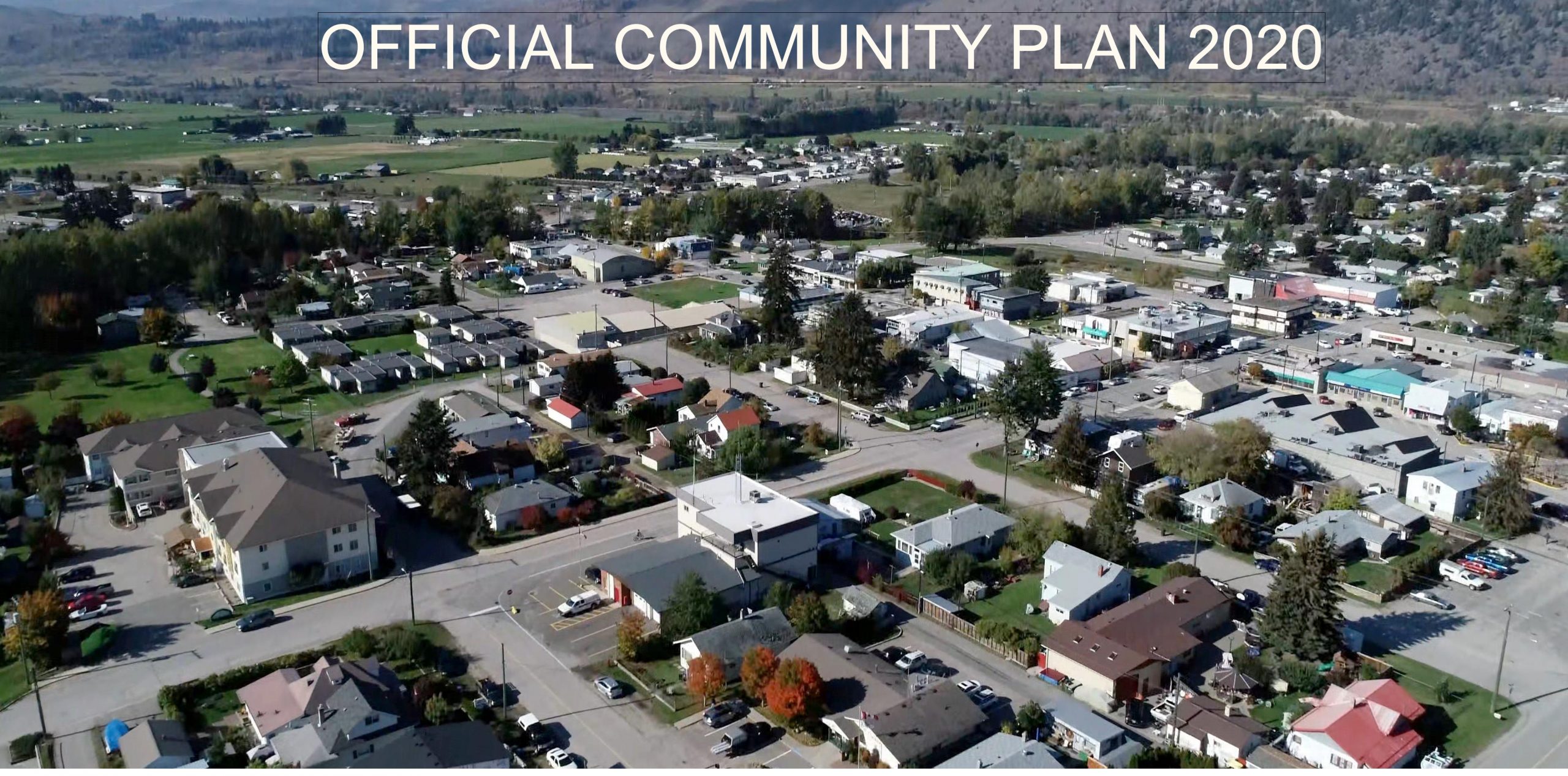Click to see the draft OCP: Official Community Plan 2021
Introduction
Over the course of 2020, the Village of Chase will be working to develop a new Official Community Plan (OCP). OCP’s are important, future-oriented documents for municipalities. They provide a vision and supporting policies for how a community is to develop in the future. Perhaps most importantly, the OCP outlines to the community, developers, senior government agencies, industries, businesses and other stakeholders how Chase wishes to evolve into the future.
Why is an update to the OCP needed?
The 2020 OCP is an opportunity to develop a plan that allows the community to not only survive, but thrive, as the community evolves. Chase’s last OCP was adopted in 2002. Typically, OCPs are reviewed every five years or so depending on the community dynamic (for example, significant changes in development, planning, or population demographics). It is timely to update Chase’s OCP for a number of reasons in order to prepare the community for the future. The previous OCP does not account for changes in legislative requirements for OCPs, such as requirements for greenhouse gas emissions reductions targets, nor does it account for key changes in the community since 2002, including:
- An aging and declining population according to Statistics Canada Census data and BC Stats population projections;
- Volatility in the forestry and agricultural sectors that could change Chase’s traditional employment base;
- Growth of the regional tourism industry; and
- Proposed Highway 1 construction that could impact access into the community.
Since 2002, issues that were typically more prevalent in larger communities have started to be considered in smaller communities. These include topics such as affordable housing, climate change adaptation and mitigation, food security and health and wellness (including mental health and addictions). While many of these issues are outside of the direct jurisdiction of local governments to address, pressures from residents within communities, as well as increased reliance on collaboration with senior government agencies to address these issues, means that local governments, even in smaller communities, are dedicating some resources to these issues. An OCP can provide the policy direction for the local government in terms of how to address these issues that are outside of its jurisdiction.
At a national and global level, there are many other issues that are either already impacting Chase, or have the potential to impact the community, that need to be reflected in the OCP. These include:
- Risks associated with climate change, primarily the increased risk of flooding that could imperil lives and property; increased risk of drought that could impact the agricultural industry as well as Chase’s own water supply; and increased risk of wildfires that not only imperil lives and property but could impact the regional tourism industry. In addition, the impacts of climate change on salmon in the area could have significant impacts, not only to a keystone indicator species, but also to the tourism industry;
- Emergence of high-speed internet which continues to change the way in which people carry out day-to-day activities and the impact this is having on traditional retail areas;
- Continued development of automation in day-to-day jobs and emergence of the ‘gig economy’ which impacts commercial and residential development;
- The pursuit of reconciliation with Indigenous peoples in Canada and relationships between local governments and nearby First Nations;
- Increases in housing costs;
- The impact of cannabis legalization in Canada and the potential economic and business development opportunities associated with this in the Chase area; and
- Aging of the population across Canada, meaning greater competition for younger people to live in communities, as well as a need to determine how to make ‘aging in place’ a more practical reality.
On a practical level, there have been instances where an updated OCP would have been helpful. Recently, two projects did not have full approval from the community and ultimately did not proceed because of this: the proposed development of waterfront lands and the potential development of a biomass energy plant. While these issues will inevitably surface as new opportunities for development present themselves, an up-to-date OCP will ensure that decisions on these developments are made with a current understanding of the vision for Chase and the policy framework to help achieve that vision.
What Will The Chase OCP Do?
There are a number of issues that the OCP must or can address. These issues include, but are not limited to:
- Developing a community vision for growth and development into the future. It will essentially answer the questions, “What should the community look like in the future?” and “What it will be like to live in Chase?”;
- Projecting population growth into the future;
- Establishing land use designations (e.g., where and what type of future development should go);
- Identifying housing needs into the future and provide policies for affordable housing;
- Providing direction for infrastructure (roads, water, sewer, drainage), including levels of service and infrastructure development;
- Addressing issues of form and character in development, particularly in commercial, industrial and intensive residential areas;
- Identifying environmentally sensitive areas and strategies to protect them;
- Providing direction and identifying needs for public facilities including schools, parks and recreation facilities;
- Identifying economic development opportunities;
- Addressing the needs of an aging population, including accessibility and visitability standards;
- Developing strategies for greenhouse gas emissions reductions and reviewing energy issues;
- Identifying important cultural and heritage values;
- Developing policies that cover a wide range of issues including those that are required to be covered under the Local Government Act.
The OCP will be a key communications tool to the community, potential developers, senior government agencies, industry and business, and others about how Chase wants to evolve in the future. The OCP will also provide direction for other plans and policies that are used for the planning, development, and operation of the community. This would include the Zoning Bylaw, the Subdivision Development Servicing Bylaw, parks and recreation programming.
What will the process look like?
A work program and schedule has been developed which emphasizes meaningful public consultation throughout the process and efficiency in completing the bulk of the work in 2020. The process can be summarized in five phases:
Phase 1 Project Initiation (ongoing)
– Developing a communications and engagement strategy
– Undertaking a community survey to seek initial input on key community issues
Phase 2 Background Data Collection (ongoing)
– Collect and summarize relevant community data on a wide range of issues
SURVEY RESULTS: 2020 Survey Summary memo
Phase 3 Community Planning Week (March 9-12)
– The project consultants would lead a comprehensive consultation process over the course of one week in Chase. The process would include:
Here are the display panels from the Open House held March 12: OCP Open House Panels
Here is the comprehensive report from the Community Planning Week: OCP Week Summary (April 27, 2020)
Phase 4 Develop Draft of OCP (Spring 2021)
– Based on consultation, the draft of the OCP will be developed
Click here to to see the Housing Needs Assessment report
Click here to see draft OCP
Phase 5 Approval Process (Autumn 2021)
– Referral of the OCP to local First Nations and to key agencies
– First and second reading
– Public hearing
FINAL OFFICIAL COMMUNITY PLAN, ADOPTED OCTOBER 26, 2021: OCP 896-2021
How to get more information?
Stay tuned to this website. For more information or to provide comments, please contact:
Sean O’Flaherty, Corporate Officer
soflaherty@chasebc.ca
250-679-3238


